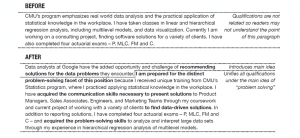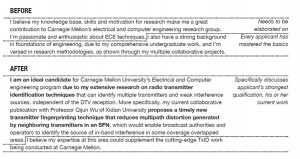A good personal statement needs to tick the following checklist:
√ Clarity of thoughts
√ Links everything back to your subject of interest
√ Own voice
√ Specific claims supported by evidence
√ English language and structure
Examples of before and after personal statement revisions based on the CLOSE principle.
CLARITY
BEFORE
With the increasing power of computer processing, we are now dealing
with an amount of data that we couldn’t have even dreamed of in the past.
Via data science, we can now do things ranging from unearthing
useful information, discovering the hidden rules (it’s not clear what rules).
AFTER
With the increasing power of computer processing, we are now dealing
with an amount of data that we couldn’t have even dreamed of in the past.
Via data science, we can now do things like unearthing useful information
and even gaining the ability to foresee the future.
LINKS

OWN VOICE
Instead of using a passive voice, use a more active voice, and ask yourself how and why.
Instead of:
- “Based on extensive personal experience and exemplary coursework, medicine is obviously a challenge that will last a lifetime.”
Elaborate:
- “I spent many years of my childhood observing how my father took care of my auntie, who had a terminal illness. The lack of sound medical advice in our village very often sent him to desperation. Since then, I had realised how important it is to have a better knowledge of medicine. After succeeding in my academic performance, I have made up my mind to pursue medicine as a lifelong career.”
SPECIFIC

English
– Grammatical mistakes can make a bad impression on Admissions Officer about you. Make sure you check all your grammars.
– Move paragraphs around to ensure the flow of the narrative. Sometimes it’s best to not write the PS in order. Write it in sections of information, then move the sections around to create the best story flow.
Other tips:
✔ Killer opening – a strong opening will make an immediate impression.
✔ Show, don’t tell: instead of saying I am very good at something, give examples.
✔ Ask “so what” question: for example: if you play flute or basketball, can you make that relevant to your future success at university or should other factors take priority? You may be good at many things, but everything you mention needs to link back to your subject of interest. You may be very good at cooking, which doesn’t seem to have any relation to computer science, but if you can demonstrate that the organisation and creative skills involved, which are dissimilar to the mentality requires in exploring computing science knowledge, you can mention that. Otherwise, ask yourself “so what” when you write down any facts.
✔ Necklace approach: loop the beginning and the end together nicely.
Example:
Introductory hook:
When I was nine-years-old I found a wounded wren in my back garden. I placed her in a shoebox and tried to nurse her back to health, but I wasn’t sure if my actions were helping, and within three days she died. It was then that I realised I wanted to be a veterinarian – to have the knowledge to help animals.
Theme: Helping and compassion aided by knowledge
Using this theme in the academic section: During my undergraduate studies in Biology, we learned about degenerative cell degradation, and my research project focused on limiting cell degradation through hydration. While this project was on a cellular level, working with eukaryotes, I’d like to take this concept to understand how hydration may help farm animals, such as sheep, live longer.
Ending hook:
By studying for an MA in animal sciences, I will have the knowledge to help wounded and sick animals. Be it a wren in my garden or livestock on afar.
Finally, a personal statement should be unique and personal – that’s why it’s called a personal statement. There should be a unique story about you. Don’t copy other people’s personal statements.


